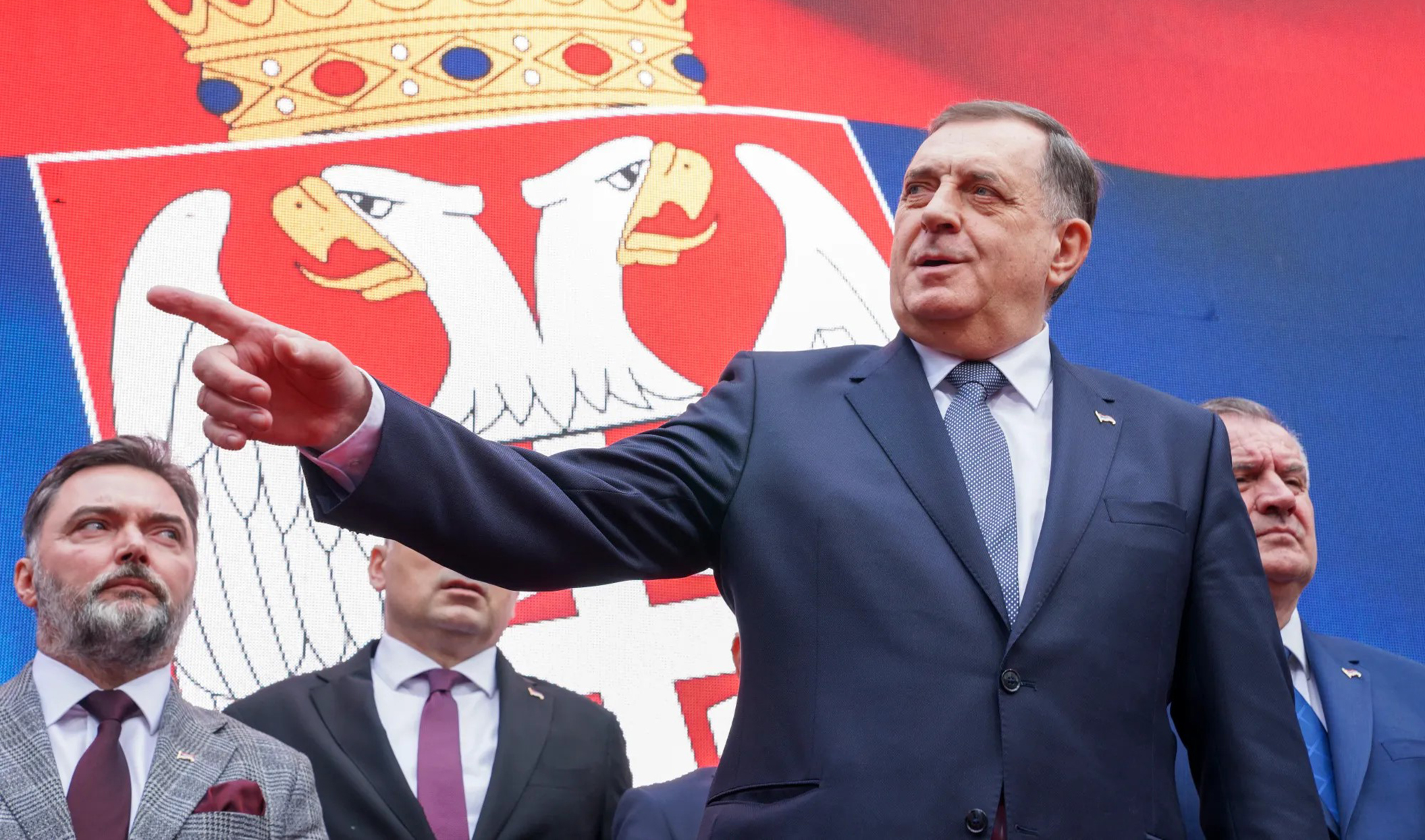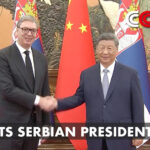The leader of the Bosnian Serbs, Milorad Dodik, whom the Central Election Commission of Bosnia and Herzegovina deprived of the mandate of president, continued to play for higher stakes. He announced a series of visits to Russia during which he plans to secure support for achieving the independence of the Republika Srpska and for ending the mandate of the European military presence in BiH.
“Fight against the occupation”
In a recent interview with Russian media Dodik stated that he wants to put an end to the activities of the European Union military mission in Bosnia and Herzegovina, EUFOR Althea. For this purpose, the leader of the Bosnian Serbs will turn to Moscow for help. “I will ask our Russian friends to revoke consent and to veto at the Security Council with regard to the European international forces,” he said.
Similar statements have been made before. Already at the beginning of March this year Dodik reported that a high-level meeting would soon be held in Russia at which he would ask for a veto to be imposed on EUFOR’s presence in BiH. He made that statement after the Prosecutor’s Office of Bosnia and Herzegovina issued an arrest warrant for him, and the media began discussing whether EUFOR forces should take part in his detention. Dodik then demanded that the commander of the European forces in BiH “adhere to his mandate” and threatened that “the Serbs will not tolerate occupiers”.
However, EUFOR in no way intervened in the situation.
EU officials then informed the authorities of Bosnia and Herzegovina that EUFOR would not conduct an operation to arrest the President of the Republika Srpska Milorad Dodik. As Bosnian media claimed, this was communicated to the Minister of Foreign Affairs of Bosnia and Herzegovina Elmedin Konaković during his visit to Brussels. It was reported that the High Representative of the EU for Foreign Affairs and Security Policy Kaja Kallas said during the meeting with Minister Konaković: “The European Union is not ready to use EUFOR troops to arrest Milorad Dodik”.
After the meeting with Kallas, Konaković said that official Sarajevo “does not expect” EUFOR to arrest Dodik because “they do not have a mandate to do so, and they must not do it”.
Nevertheless, the issue was not exhausted.
In April Dodik gave an interview to Russian media in which he explained his position in more detail regarding the need to end the European military mission in BiH.
“Some European representatives have begun to speak about a changed role for EUFOR. This changed role of EUFOR does not interest us, and we do not want Althea to change its mandate. And so we always tell our partners in Russia that if this happens, such a thing should not receive consent in the Security Council. We will assess the development of the situation, there is time. The decision is made every year in October, and we will be watching how they behave,” he said.
The visits Dodik has now announced to Russia and his request for a veto on the extension of the EUFOR mandate indicate that, in his view, the European mission “has been behaving” “badly,” that is, in a way that does not suit Banja Luka.
Today the main grievance of the leader of the Bosnian Serbs against the EU forces does not concern any specific actions of EUFOR, and even a possible change of mandate is no longer mentioned. At the current stage Dodik is expressing his dissatisfaction with the presence of European forces in BiH in principle, in general. He calls the European military mission an “occupying international authority,” indicating that it is part of the international presence in BiH, which Dodik, in fact, does not accept.
“There is a local civil administration of a foreigner named Schmidt (High Representative of the international community Christian Schmidt) and an armed part of this occupation called Althea. We want to remove both,” he said.
“Forward, to independence”
Dodik’s plan consists not only of a veto to prevent the extension of EUFOR’s mandate but also of achieving (in some format) the independence of the Republika Srpska.
“To remove them (EUFOR Althea and the High Representative) — we must be a separate state,” says the leader of the Bosnian Serbs. “To get rid of all this (EUFOR Althea and the High Representative), we must demand the withdrawal of occupying troops and the removal of foreigners from decision-making. This is not possible at the level of Bosnia and Herzegovina, so the Republika Srpska must proclaim independence and create a mechanism of governance fully independent of Sarajevo, of Bosnians and of foreigners living there,” he emphasized.
In all these steps Dodik intends to rely on support from Moscow.
“Soon I will go to Moscow, where I will hold meetings with influential people. I think that somewhere in October I will go to Russia again and will be able to meet with the Russian president again. …I will ask them to support us in our endeavor to hold a referendum and achieve independence,” he said.
This does not mean the referendum already appointed by the National Assembly of the Republika Srpska, but another, new poll.
Dodik explained to Russian journalists that it is planned to adopt a Resolution on RS self-determination, after which a referendum on the independence of the Republika Srpska will be held.
According to Dodik, during his announced visit to Russia he will appeal to “Russian friends” to support the Republika Srpska at the UN General Assembly in its efforts to hold a referendum on independence.
Some experts are certain that these initiatives of Dodik are his personal fabrications, and Moscow is not enthusiastic about the leader of the Bosnian Serbs’ adventures. But the very fact that Russian state media broadcast these and other similar statements by Dodik allows one to assert that the aspirations he voiced are at least met with understanding in the Kremlin.
Common goal and special interest
The positions of Banja Luka and Moscow regarding the “international presence” in BiH have long been identical. Neither Russia nor the Republika Srpska recognize Christian Schmidt as High Representative because his candidacy was not approved in the UN Security Council. Now, apparently, the Bosnian Serbs together with “Russian friends” have a plan to declare the European military mission in Bosnia and Herzegovina “persona non grata” as well.
The goal of these joint plans can be described thus: the creation of conditions under which the international community will not have mechanisms to counteract
- the destabilization of BiH, which could lead to a new conflict in the region;
- attempts to achieve the independence of the Republika Srpska, that is, attempts to destroy the Dayton Peace Agreement;
- the strengthening of Russian influence in BiH, and in the region in general.
The fact is that possible configurations of the involvement of European military contingents to ensure the peace process in Ukraine are currently being actively discussed. Against this background the Kremlin may consider the EUFOR Althea case in Bosnia and Herzegovina an integral part of its relations with the European Union and the West in general, as a component of the security situation on the continent, as an important element of the balance of power in Europe.
The process of achieving the “independence of the Republika Srpska” announced by Dodik, the discussion of this issue — with Russian participation — at the UN General Assembly, is also a piece of the overall map of spheres of influence on the European continent.
Conclusions
An analysis of Milorad Dodik’s statements and plans indicates that his actions are part of a broader geopolitical strategy that has deep roots in Russian interests. Dodik, essentially, acts as a conduit and trumpet of the Kremlin, not as an independent regional leader. His efforts are aimed not only at protecting his own political ambitions but also at implementing Moscow’s objectives in the region.
Instrumentalization of Dodik. Dodik is used by Russia as an instrument for the destabilization of the Western Balkans. His statements and plans, which are actively broadcast by Russian state media, are part of coordinated efforts aimed at weakening the influence of the EU and the West in Bosnia and Herzegovina and in the region.
Undermining international mechanisms. Dodik and Moscow’s joint goal is to destroy or render ineffective the international institutions that ensure the stability of BiH. This includes the discrediting of the Office of the High Representative and the removal of the EUFOR mission.
Risk of a new conflict. The success of these plans could lead to the destruction of the Dayton Peace Agreement, which is the foundation of the modern architecture of Bosnia and Herzegovina. This, in turn, could create, or rather, restore a hot spot in the very heart of Europe.
Geopolitical game. For Russia the situation in BiH is part of a broader geopolitical struggle with the West. Using the EUFOR Althea case, the Kremlin is trying to create a precedent that could be used in future negotiations on the security situation on the continent, including in the context of the conflict in Ukraine.
Overall, Dodik’s actions are a serious threat to the stability of Bosnia and Herzegovina and all of Europe, highlighting the region’s vulnerability to external manipulation and influence.



